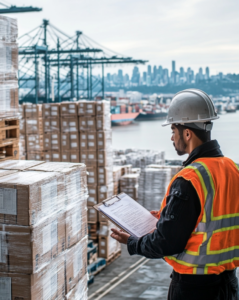In today’s rapidly evolving global economy, efficient logistics and supply chain management are paramount to business success. One of the pivotal elements in this arena is the bonded warehouse, especially in regions like Malaysia, where trade dynamics are continually shifting. This article aims to provide an in-depth exploration of bonded warehouses, elucidating their purpose, benefits, and strategic importance for businesses with a transactional intent.
Understanding the Bonded Area: Meaning and Implications
The term “bonded area” refers to a designated zone within a bonded warehouse where imported goods can be stored without immediate customs duty payment. Governed by customs authorities, these areas are crucial for compliance with international trade laws. The primary function of a bonded area is to offer businesses a cost-effective storage solution, enabling them to defer taxes and duties, thus optimizing cash flow.
For example, an importer dealing in luxury goods like high-end electronics or designer apparel can utilize a bonded area in Malaysia to store these items without the upfront cost of duties. This financial flexibility is invaluable, particularly for businesses that need to maintain a delicate balance between inventory levels and market demand. By leveraging bonded areas, companies can strategically time the market entry of their products, aligning with demand peaks and optimizing profitability.

The Multifaceted Role of Bonded Warehouses
A bonded warehouse is a secure storage facility where imported goods can be held, processed, or lightly altered without paying duties until they are released for domestic consumption. These warehouses are under the supervision of customs authorities, ensuring adherence to international trade regulations. Bonded warehouses serve as a strategic tool in global trade, offering businesses the flexibility to manage their goods effectively.
Diverse Types of Bonded Warehouses
Bonded warehouses come in several types, each tailored to specific business needs:
- Public Bonded Warehouses: These are accessible to multiple businesses and are typically operated by third-party logistics providers. They are ideal for companies looking for flexibility and cost-sharing benefits. Businesses can benefit from economies of scale, reducing the overall cost of logistics and warehousing.
- Private Bonded Warehouses: Owned and operated by individual companies, these warehouses cater exclusively to the needs of the owner, offering greater control over storage conditions and inventory management. This setup is especially beneficial for companies with specific storage requirements or those dealing in high-value goods.
- Specialized Bonded Warehouses: Designed for specific types of goods, such as food products, pharmaceuticals, or hazardous materials, these warehouses are equipped with facilities to ensure proper storage conditions, complying with stringent regulatory standards. Businesses dealing in perishable goods or items with strict regulatory controls can greatly benefit from these specialized facilities.
Key Benefits of Utilizing Bonded Warehouses
Bonded warehouses provide numerous advantages, making them indispensable for businesses engaged in international trade:
Duty Deferral and Financial Flexibility
The most notable advantage of bonded warehouses is the postponement of duty payments. This deferral allows businesses to allocate financial resources more strategically, enhancing cash flow management. For instance, a company can import bulk shipments without the immediate burden of duties, enabling it to invest capital elsewhere, such as in marketing or product development.
This financial flexibility is particularly beneficial in volatile markets where currency fluctuations can impact profitability. By deferring duty payments, businesses can mitigate risks associated with foreign exchange and optimize their financial strategies.
Enhanced Cash Flow Efficiency
By deferring duty payments, businesses can optimize their working capital. This is particularly beneficial for small and medium-sized enterprises (SMEs) that may face cash flow constraints. The ability to hold goods in a bonded warehouse without immediate financial outlay allows these businesses to manage their resources more effectively, ensuring liquidity for day-to-day operations.
Additionally, businesses can leverage bonded warehouses for inventory financing. By using stored goods as collateral, companies can access credit facilities, providing additional financial leverage for growth and expansion.
Opportunities for Re-exporting
Goods stored in bonded warehouses can be re-exported without incurring local import duties. This offers significant strategic advantages for businesses operating in multiple markets, allowing them to respond swiftly to global demand shifts without being financially penalized. For example, a business might import products to Malaysia and, if market conditions change, decide to re-export those goods to another country where demand is higher.
This flexibility is crucial for businesses operating in industries with seasonal demand fluctuations or those exploring new international markets. By utilizing bonded warehouses, companies can test market entry strategies with minimal financial risk.
Security and Compliance Assurance
Bonded warehouses are equipped with robust security measures, ensuring that stored goods are protected against theft, damage, or unauthorized access. This high level of security provides peace of mind for businesses, particularly those dealing in high-value or sensitive goods. Additionally, customs oversight ensures that all stored goods comply with relevant regulations, mitigating the risk of legal issues.
For businesses dealing in regulated goods, such as pharmaceuticals or chemicals, compliance with international standards is non-negotiable. Bonded warehouses provide the infrastructure and processes necessary to adhere to these standards, ensuring seamless international operations.
Streamlined Inventory Management
Bonded warehouses offer businesses the ability to conduct various inventory management activities, such as repackaging, labeling, or light assembly. This flexibility enables companies to streamline their supply chain processes, ensuring that products are market-ready before release. For instance, a business might import unfinished goods, complete final assembly in the warehouse, and then distribute them to domestic markets.
Such capabilities are essential for businesses looking to customize products for different markets or adhere to local labeling requirements. By leveraging the services offered by bonded warehouses, companies can enhance their operational efficiency and reduce time-to-market.
The Strategic Importance of Bonded Warehouses in Malaysia
Malaysia’s strategic geographic location and robust infrastructure make it an ideal hub for international trade. Bonded warehouses in Malaysia are integral to facilitating efficient trade flows across the region. The Malaysian government, via the Royal Malaysian Customs Department, plays a crucial role in regulating these warehouses, ensuring they comply with international trade standards.
Government Support and Initiatives
The Malaysian government actively promotes the use of bonded warehouses through various initiatives. These include streamlined customs procedures, financial incentives, and support for businesses that leverage bonded facilities. Such initiatives aim to enhance Malaysia’s attractiveness as a logistics hub in Southeast Asia, encouraging more businesses to establish operations in the region.
For instance, the government’s focus on digital transformation and the integration of advanced technologies in logistics operations has paved the way for the development of smart bonded warehouses. These facilities utilize IoT, AI, and blockchain technologies to enhance operational efficiency, improve transparency, and streamline customs processes.
Practical Applications Across Industries
Bonded warehouses in Malaysia are utilized across a diverse range of industries. The electronics sector, for example, often uses bonded facilities to store high-value components, deferring duties until assembly and distribution. Similarly, the automotive industry benefits from duty deferral on imported parts, allowing manufacturers to manage costs more effectively and maintain competitive pricing.
The pharmaceutical industry is another sector that benefits immensely from bonded warehouses. By storing imported raw materials and finished products in bonded facilities, pharmaceutical companies can manage their inventory more efficiently, ensuring timely supply to meet market demand.
Statistical Insights on Bonded Warehouses in Malaysia
According to data from the Royal Malaysian Customs Department, the number of bonded warehouses in Malaysia has been steadily increasing, reflecting growing demand for efficient storage solutions. As of recent reports, there are over 500 licensed bonded warehouses in the country, contributing significantly to Malaysia’s GDP through enhanced trade activities.
The Malaysian Investment Development Authority (MIDA) projects that the logistics sector, including bonded warehouses, will grow at a compound annual growth rate (CAGR) of over 8% in the coming years. This growth is driven by the rise of e-commerce, regional trade agreements, and Malaysia’s strategic position as a gateway to Southeast Asia.
In addition, a study by Frost & Sullivan highlighted that Malaysia’s strategic location and developed infrastructure are key factors driving the growth of bonded warehouses. The study emphasized that with the increasing complexity of global supply chains, businesses are increasingly turning to bonded warehouses to gain a competitive edge.
Effective Utilization of Bonded Warehouses
For businesses aiming to maximize the benefits of bonded warehouses in Malaysia, several strategic considerations are essential:
Navigating Regulatory Landscapes
Understanding the regulatory framework governing bonded warehouses is crucial. Businesses must familiarize themselves with customs regulations, licensing procedures, and compliance requirements to ensure seamless operations. Engaging with customs brokers or legal experts can provide valuable guidance in navigating these regulatory landscapes.
Moreover, staying updated with changes in trade policies and customs regulations is imperative for businesses to avoid compliance issues and penalties. Regular training and workshops for staff involved in logistics and supply chain management can ensure that businesses remain compliant with the latest regulations.
Selecting the Appropriate Warehouse Type
Choosing the right type of bonded warehouse is critical based on the nature of the goods being stored. Businesses dealing in perishable items, for example, should opt for specialized facilities equipped with temperature control to maintain product integrity.
For companies dealing in hazardous materials, selecting a warehouse that complies with safety and environmental regulations is essential. These facilities should have the necessary infrastructure and protocols in place to handle spills, leaks, or other emergencies effectively.
Leveraging Inventory Management Capabilities
Bonded warehouses offer a range of inventory management capabilities, from repackaging to quality control. Businesses should leverage these capabilities to optimize supply chain processes, ensuring products meet market standards before release. This can enhance product quality, reduce lead times, and improve customer satisfaction.
Advanced inventory management systems and software can further enhance efficiency by providing real-time visibility into stock levels, enabling businesses to make data-driven decisions regarding inventory replenishment and distribution.
Collaborating with Experienced Logistics Partners
Partnering with experienced logistics providers can help businesses navigate the complexities of international trade. These partners offer valuable expertise in customs procedures, supply chain optimization, and bonded warehouse operations, ensuring efficient and compliant use of bonded facilities.
When selecting a logistics partner, businesses should consider their track record, technological capabilities, and expertise in handling specific types of goods. A reliable partner can significantly enhance a company’s supply chain resilience and competitiveness.
Conclusion
Bonded warehouses are a strategic asset for businesses engaged in international trade, offering a multitude of advantages such as duty deferral, enhanced cash flow, and security. In Malaysia, these facilities are a cornerstone of the country’s logistics infrastructure, supporting a diverse range of industries from electronics to automotive. By understanding the concept of bonded areas and effectively leveraging bonded warehouses, businesses can optimize their supply chain operations, enhance competitiveness, and capitalize on the dynamic opportunities presented by global trade.
For businesses with transactional intent, bonded warehouses represent a powerful tool to manage financial resources, mitigate risks, and gain a competitive edge in the global market. By strategically utilizing these facilities, companies can unlock new avenues for growth and success in the ever-evolving landscape of international commerce.
In conclusion, the strategic utilization of bonded warehouses can transform a business’s logistics and supply chain management, providing a robust foundation for sustainable growth in an increasingly interconnected world. As global trade continues to evolve, bonded warehouses will remain a critical component of successful international business strategies.
Related Readings
- Freight Services in Malay: What You Need to Know
- All You Need to Know About Malaysia Cargo and Trucking Services
- Logistics Near Me: How to Find the Best Logistic Services in Malaysia
- Top Freight Forwarding Companies in Malaysia
- Air Freight Solutions in Malaysia: A Complete Guide
- Why Choose a Forwarder in Malaysia? A Guide for Businesses
- Finding the Best Logistic Company in Penang and Selangor
- Top 10 Logistic Companies in Malaysia: Who Stands Out
- Warehouse Services in Malaysia: Finding the Best Warehouse Near Me
- What is a Forwarding Agent and Why You Need One in Malaysia




